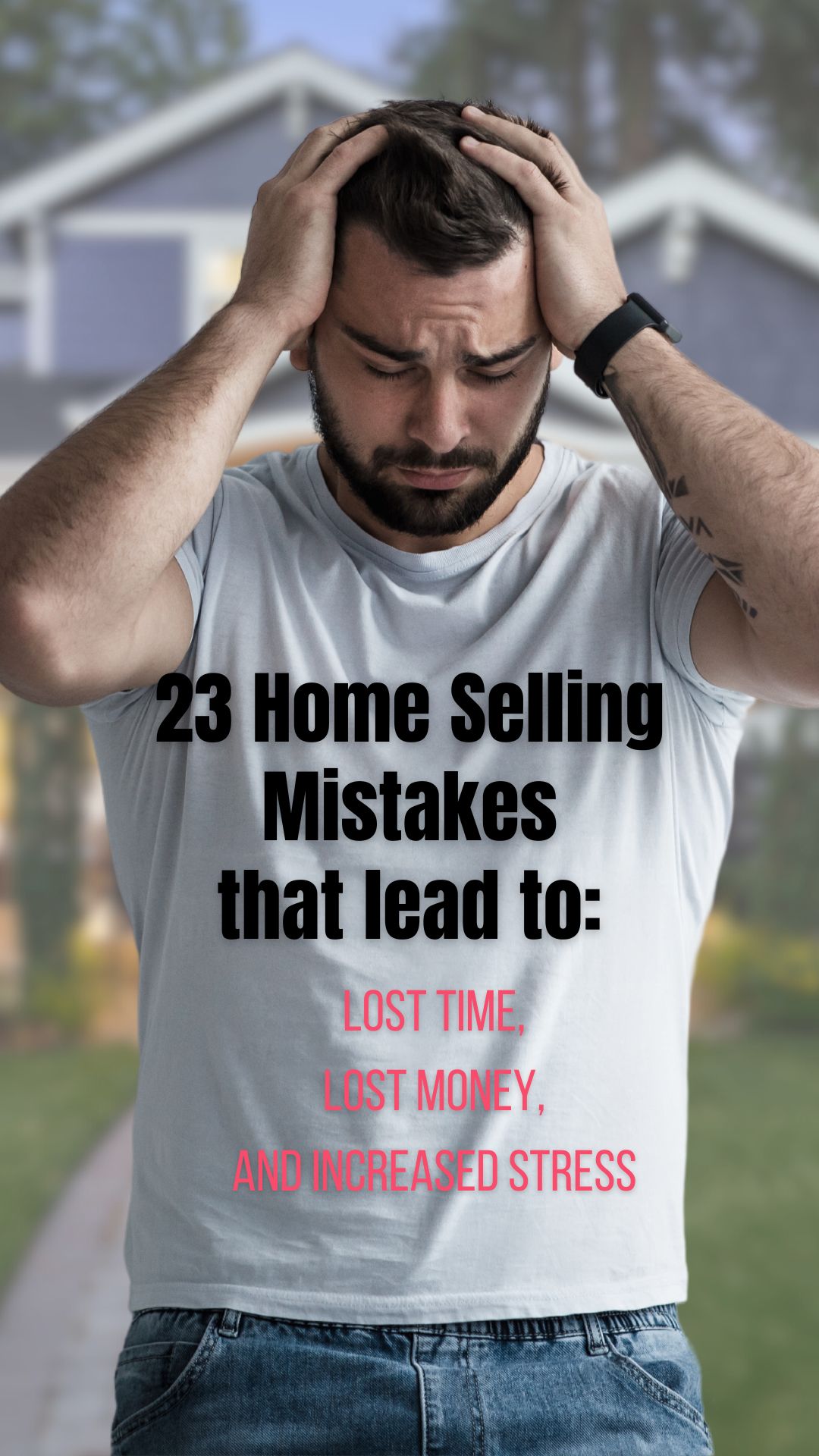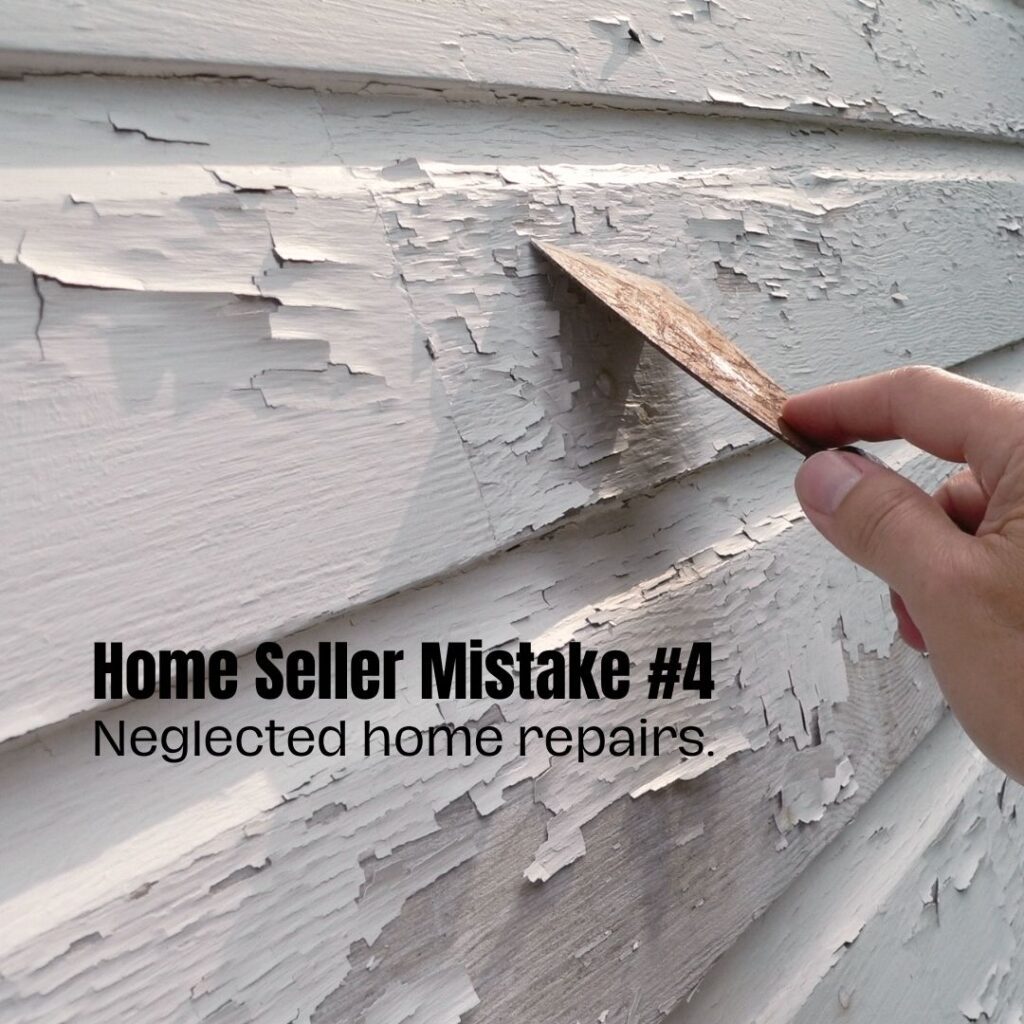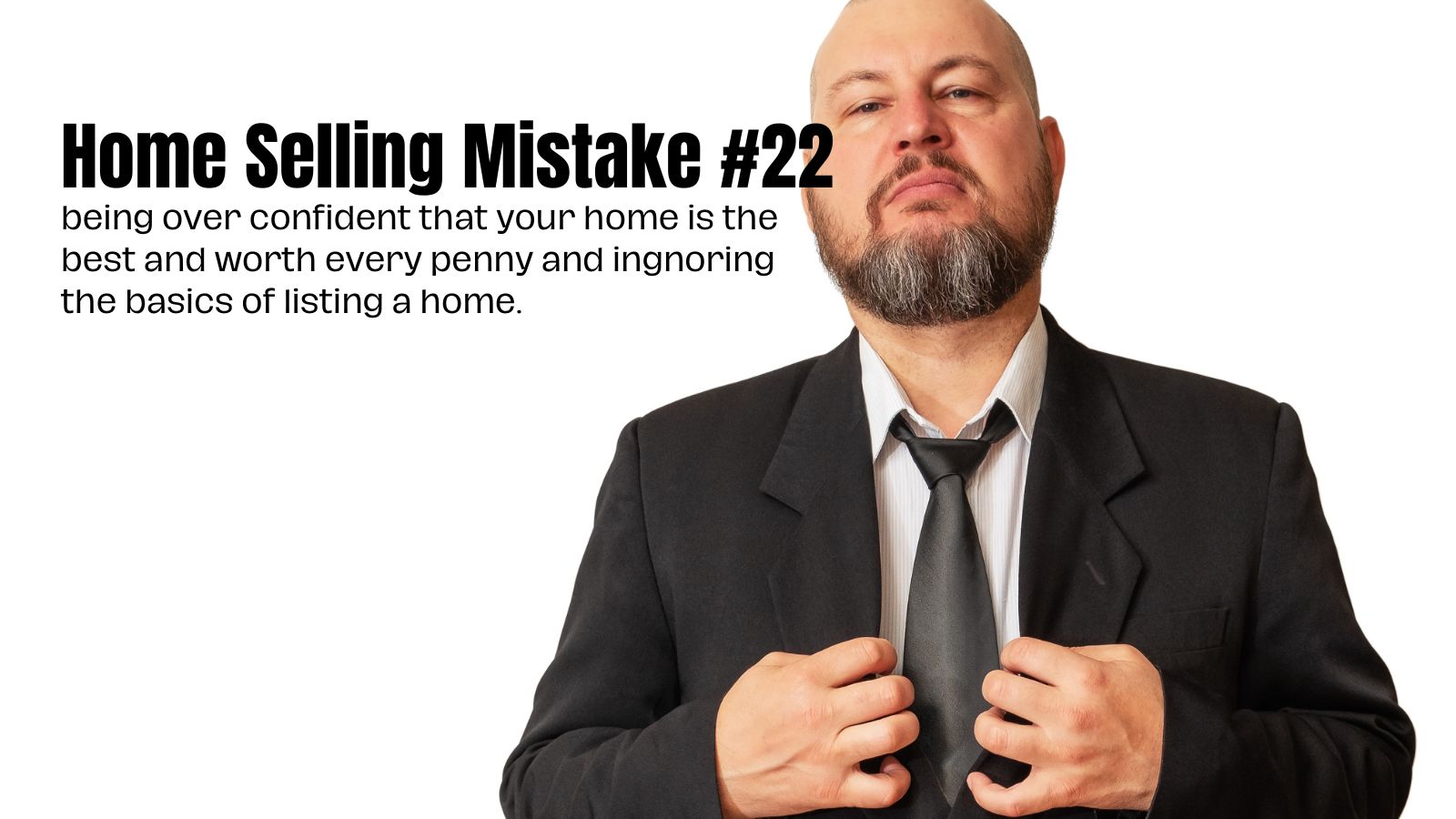
While the prospect of securing an excellent price for your home is enticing, navigating this process with caution and awareness is crucial.
Remember, while you are constantly hearing success stories of friends and neighbors selling their homes in 3 days for well over asking (and sometimes exaggerated), there are still sellers struggling to sell their houses. The struggling home seller isn’t announcing his home-selling woes around the water cooler every day.
Common home selling mistakes can erode the value of your home and prolong the selling process, causing unnecessary stress and frustration. This guide aims to illuminate the path by highlighting what not to do when selling your house, ensuring you can make informed decisions and avoid common pitfalls.
Jump To A Section....
23 Common Home Selling Mistakes
There are numerous home-selling mistakes to be made when selling your home. Let’s dive into 23 of the more popular home seller mistakes.
1. Not Expecting Home Selling Costs
A crucial aspect often overlooked by many sellers is the variety of costs involved in the home-selling process. These fees can add up, from agent commissions and closing costs to staging expenses, affecting your overall profit.
Understanding and budgeting these expenses are essential to preparing for a successful sale. Agent commissions typically account for a significant portion of these costs, usually between 4%- 6% of your home’s selling price.
Closing costs, including taxes, title transfer, and attorney fees, further add to the financial considerations. By anticipating these costs, you can set a realistic price for your home and avoid unpleasant surprises.
2. Selling Without an Agent or Hiring an Inexperienced Agent
The decision to sell your home independently or hire an inexperienced agent can be costly. While saving on commission fees by going the For Sale By Owner (FSBO) route is tempting, it often leads to undervaluation and longer market times.
Professional real estate agents bring expertise in market analysis, pricing strategies, and negotiation skills, significantly impacting your ability to secure a favorable deal. Think twice about hiring an inexperienced family member as your real estate agent.
Additionally, an experienced agent has a network of potential buyers and marketing resources that can expedite the selling process. Choosing the right agent is pivotal in ensuring a smooth and successful sale.
3. Pricing the Home Incorrectly
One of the most common errors a seller can make is mispricing their home. An overpriced home languishes on the market while underpricing can lead to significant financial loss.
The key to setting the right price lies in a thorough comparative market analysis, understanding the current housing market trends, and comparing similar properties in your area.
A well-informed real estate agent or REALTOR can provide invaluable insights into setting a competitive and realistic price that attracts potential buyers while ensuring you get the best possible return.
4. Neglecting Major Repairs and Making Costly Renovations
Selling a home isn’t just about aesthetics; it’s also about ensuring everything functions correctly. Major repairs, such as fixing a leaky roof or addressing electrical issues, must be addressed.
However, diving into extensive renovations is only sometimes a wise investment. Not all remodeling projects yield a high return on investment, and some may even deter buyers who prefer to add their personal touch. Focus on repairs and improvements that enhance the home’s structural integrity and overall appeal, like fresh paint or updated fixtures.
And certainly, talk with your REALTOR about what remodeling projects may give you a return and the ones that won’t.

5. Not Preparing the Home for Sale
The presentation is a step in the selling process that should be considered. First and foremost, if you do nothing else, your home should be sparkling clean.
A cluttered, unkempt house is hard for potential buyers to envision as their future home.
Staging, which involves decluttering, rearranging furniture, and possibly renting decor, can significantly impact a buyer’s perception. Moreover, don’t overlook the exterior – curb appeal matters.
Simple actions like maintaining the lawn, planting flowers, or repainting the front door can make a difference.
6. Choosing the Wrong Agent or Selling Method
The route to sell your home – whether through a real estate agent, FSBO, or an iBuyer – has significant implications.
Each method has its pros and cons. For instance, while an agent might charge a commission, their expertise often leads to better deals and quicker sales.
On the other hand, FSBO might seem cost-effective but can be time-consuming and less effective. Evaluate your priorities, resources, and the current market to make an informed decision.
Lower selling costs, like commissions don’t necessarily lead to higher net proceeds.
7. Limiting Showings
Restricting access to your property can significantly hinder the selling process. The more potential buyers view your home, the higher the chances of receiving offers. It is essential to be flexible with showings, even though it might cause temporary inconvenience. This includes being ready for last-minute visits and keeping your house presentable throughout the period it is on the market.
Remember is all it takes is one buyer to make an offer. If a buyer finds it to difficult to get into your home for a showing, they move on.
8. Ignoring the Broader Financial Situation
Underestimating the financial implications of selling your home can lead to stressful surprises. It’s important to have a clear picture of your financial situation, including any debts and the potential expenses involved in moving.
Consult with financial advisors or mortgage specialists to understand the implications of the sale on your finances. This forethought ensures you make decisions that align with your long-term financial goals.
9. Avoid Over-Personalization of Interiors
While your home reflects your personal style, it’s crucial to appeal to the broadest range of buyers when selling. That means toning down your personal style
Over-personalization, like bold paint colors or unique decor, can make it hard for buyers to envision the house as theirs.
Opt for neutral colors and remove personal items such as family photos or eclectic collections. This step transforms your home into a blank canvas, allowing potential buyers to project their visions and dreams onto it.
How you live in your home differs greatly from how you should present it to the home-buying public. Think like you are merchandising your house and playing up its best features and downplaying less desirable features.

10. Don’t Neglect Minor Repairs
Minor issues like a dripping faucet, a squeaky door, or chipped paint might seem trivial but can signal neglect to buyers. Addressing these minor repairs demonstrates that the house has been well-maintained, boosting buyer confidence.
A small investment in fixing these issues can significantly impact your home is perception and expedite the selling process.
11. Avoid Being Present During Showings
It’s natural to want to be present during showings to answer questions, highlight how awesome your home is or meet the home’s new owners.
However, this can put buyers on edge, making them less comfortable to explore and discuss the property openly.
Leave the showings to your real estate agent, who knows how to showcase your home’s best features and answer any queries from a professional standpoint. If you happen to run into a potential buyer avoid any conversation about the house and the neighborhood and ask all questions, be directed to your REALTOR.
12. Don’t Overlook Professional Cleaning
A clean home is inviting and suggests well-maintained property.
Investing in professional cleaning services, especially for key areas like kitchens and bathrooms, can make a significant difference. A spotless home looks appealing and helps create a positive impression on potential buyers, suggesting a home that’s ready to move into.
A deep clean is the single most important task you can do to sell your home.
13. Avoid Ignoring Odors
Odors can be a major turn-off for potential buyers. Whether pet smells, cigarette smoke, or cooking odors, they can be a red flag, suggesting a lack of cleanliness or more severe issues.
Before showings, ensure your home smells fresh and clean. Sometimes, more than simply airing out rooms is needed, and you may need to deep clean carpets or upholstery.
Avoid masking odors with heavy artificial smells; it leaves home buyers wondering what you are trying to hide.
14. Don’t Dismiss the Importance of First Impressions
First impressions are lasting, and this holds especially true in real estate. A well-maintained front yard, a clean and welcoming entrance, and an attractive online listing are crucial.
Spend time ensuring the exterior of your home is as inviting as the interior. This includes maintaining the lawn, painting the front door, or adding a few potted plants for a splash of color.
If you start your home buyers showing off with a great first impression, it is easier to maintain that impression than trying to turn around a bad first impression.
15. Avoid Misleading Descriptions in Listings
Honesty is key in your property listing. Overstating features or omitting issues can lead to distrust and lost interest.
Be transparent about the condition of your home and its features. This honesty builds trust with potential buyers and can lead to a smoother transaction process.
You also want the right potential buyers to view your home instead of attracting the wrong buyer, who will only be disappointed when they arrive due to overstating the features of your home.
16. Getting Emotional
Letting emotions drive the selling process leads to bad decisions and mistakes. Selling a family home can be emotional.
And emotions can lead to making critical mistakes, like overpricing your home, overestimating your home’s position in the market, not considering reasonable offers and more.
One reason to work with a real estate agent is for them to provide you with objectivity to the process. Your agent is not emotionally invested like you are and can keep you on point.
17. Avoid Refusing to Negotiate
Flexibility is a crucial aspect of the home-selling process. Being too rigid in negotiations, whether on price, closing dates, or contingencies, can scare away potential buyers.
Understand that negotiation is a part of the process and being open to compromise can lead to a successful sale.
Rather than completely shutting down negotiations, make a small concession to keep the dialogue going. It is not unusual to turn an unacceptable offer into one you are willing to accept if you step back, remove the emotion and try to keep negotiations moving forward.
18. Don’t Ignore Feedback from Showings
Whether positive or negative, feedback from potential buyers is a valuable resource. It is the most valuable tool you have once the home is listed.
It provides insights into what buyers look for and any red flags they might notice. Use this feedback constructively to adjust, whether it’s minor repairs or simple staging tweaks, to make your home more appealing to future viewers.
One bad comment doesn’t necessarily mean anything, but it is time to act if the same issue repeats itself in the feedback.
19. Avoid Poor Quality Listing Photos
In the digital age, your online listing is often the first impression potential buyers will have of your home.
Investing in professional photography that highlights your home’s best features is crucial. Well-lit, high-quality photos can significantly increase the interest in your property and set a positive tone for viewings.
Great real estate photography is at the crux of your home’s marketing efforts. Hire a REALTOR that will provide quality, professional real estate images.

20. Don’t Skimp on Marketing Efforts
Effective marketing is key to reaching a broad audience of potential buyers. This includes listing on popular real estate platforms and leveraging drone images, social media and virtual tours. Modern marketing of a home goes far beyond a few open houses.
A comprehensive marketing strategy ensures that your property gets maximum exposure, increasing your chances of a quick and profitable sale.
21. Think That Everyone Loves Your Pet
Not everyone loves your pet like you do. Some will even find it a huge turn-off, envisioning stained flooring under the carpets, smells they can’t get rid of, and allergens that trigger allergies in a family member.
Try to minimize evidence of a pet in your home and repair any pet damage in your house. If you have a dog, remove them during showings. There is nothing worse than having a barking, growling dog in a crate while trying to view a house.
22. Avoid Overconfidence
Being overconfident in your home’s ability to compete in the real estate market leads to many things that could be improved.
It is okay to be cautiously optimistic about the sale of your home. But don’t let it turn into overconfidence and arrogance. It can lead to you overpricing your house, ignoring home preparation basics, and an overall attitude that will stall a sale at every turn.

23. Failure To Understand Market Conditions
Market conditions dictate much of what happens in the real estate marketplace. All is well in good when it’s a seller’s market and home are appreciating rapidly and competition among buyers remain high.
But as a seller’s market cools it can drastically become a game changer to a home seller. And real estate markets can change on a dime. The worse thing a seller can do is ignore trends that come with market conditions and have to chase a market down.
What Will These Home Seller Mistakes Cost You?
There is a lot at stake when you decide to sell your home. For many home sellers, you want to sell your home for as much as possible.
These mistakes can impact the following:
Time: Mistakes can cost you time. Instead of getting your home under agreement in a week or two, it can linger on for months. Getting ready for showings can be tiresome. And, it would be nice to wrap up that phase quickly.
Money: There is usually a direct correlation between the time your home is on the market and how much your home sells for. Houses that sell quickly typically sell for more as they take advantage of the market buzz around a newly listed home.
As a property sits, buyers become suspicious of why no one else wants to buy it.
Aggravation: Selling a home can be a lot of work, and as it lingers on the market and you continue to show your house, your stress levels will climb.
You can avoid these common home selling mistakes by researching, hiring the right real estate agent and following their guidance and advice.
Conclusion: Charting Your Path to a Successful Home Sale By Avoiding Costly Home Selling Mistakes
Selling your house can be a smooth endeavor. You can navigate the home-selling process more confidently and efficiently by avoiding these common home selling mistakes.
Remember, preparation, knowledge, and professional support are the keys to a successful sale.
With the insights in this guide, you are well-equipped to make informed decisions, attract the right buyers, and ultimately, close a deal that meets your expectations and fulfills your goals. Happy selling!

Author Bio
Kevin Vitali is a Massachusetts REALTOR out of Haverhill MA that serves Essex County and Northern Middlesex County in Massachusetts. If you want to buy or sell a home, let me use my years of experience to get you the best possible outcome.
Feel free to contact me to discuss any upcoming moves. I am always happy to answer your questions
Call 978-360-0422 Email kevin@kevinvitali.com





